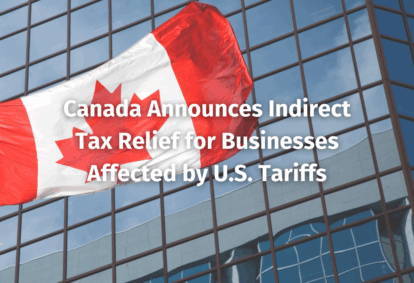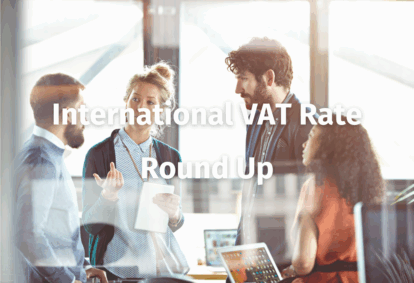Global VAT Guide: April 2022 VAT Updates
April 2022 VAT Updates in Czech Republic
On 24 March 2022, Czech Republic announced they are waiving the interest on late payments for taxpayers in the transport sector. Taxpayers in the transport sector must settle their VAT payments by 31 October 2022. The waiver of interest applies for VAT due for the monthly periods February 2022 – August 2022, or payments for Q1 and Q2 2022. VAT returns must be submitted on time.
April 2022 VAT Updates in Greece
The Greek Public Revenue Authority released a press statement that mentioned businesses no longer have an obligation to file sales list. This is because of the introduction of the online platform for e-invoicing, myDATA. Businesses need to submit their 2021 data to myDATA by 27 May 2022 and modifications can be made from 10 June 2022 to 31 October 2022.
April 2022 VAT Updates in Poland
E-invoicing
B2B e-invoicing will become mandatory in Poland from 2023. Businesses have had the ability to use the KSeF platform to send and receive e-invoices since 1 January 2022. All Polish VAT registered business will need to use the KSeF platform from 1 January 2023.
Late Payments
Poland announced they will be further increasing the late payment interest rates.
- The standard rate will increase from 8.5% to 10%.0% per annum;
- The increased rate will increase from 12.75% to 15.0% per annum; and
- The reduced rate will increase from 4.25% to 5.0% per annum.
April 2022 VAT Updates in Spain
The Tax Authorities published a draft bill that will see Spain take further steps in their implementation of B2B e-invoicing. The draft bill is expected to come into effect in January 2024. Taxpayers will need to have their computer systems compliant in order to support the billing process of businesses by this date.
These e-invoices will contain:
- A QR code; and
- An alphanumeric identification code.
This will apply to the below taxpayers:
- Subject to income tax;
- Subject to corporate tax; and
- Non-residents income tax.
Businesses will need to ensure their computer systems are updated in order to:
- Generate a billing record for every delivery of goods or services provided. This needs to happen simultaneously or before the issuance of the invoice;
- Computer systems must have the ability to send billing records generated to the State Tax Administration Agency (AEAT) securely;
- Ensure their computer system has traceability of data on their system; and
- Ensure records are not tampered with or altered.
Every invoice issued will generate a new register and all registers must include a mark or a “hash” and digital signature.
April 2022 VAT Updates in China
On 24 March 2022, the State Administration of Taxation (SAT) and Ministry of Finance announced from 1 April 2022 to 31 December 2022, taxable supplies of small-scale taxpayers that is currently subject to 3% VAT will be exempt from VAT. Taxpayers with monthly sales of below RMB 150,000 or less will be exempt from VAT.
April 2022 VAT Updates in India
A panel of state ministers are set to propose the merging of the 12% and 18% VAT rates into a 15% VAT rate.
Indian GST has a four-tier structure:
- 5%;
- 12%;
- 18%; and
- 28%.
There are also special rates for some goods making GST very complex. The state ministers were asked to suggest changes to simplify the current rate structure.
April 2022 VAT Updates in New Zealand
New Zealand’s Taxation (Annual Rates for 2021-2022, GST, and Remedial Matters) Bill will see changes to GST invoicing rules and record keeping requirements.
Below are some of the changes that will come into effect on 1 April 2023:
- The simplified tax invoice threshold is set to $1,000; and
- The low value threshold will be increased from $50 to $200 and the taxable supply information will not need to be provided.
One change that has raised concerns is there will no longer be a requirement to issue and hold a single “tax invoice” document.
Suppliers will need to provide GST registered buyers with information in relation to the supply or an amendment to the supply. The form of communication is not prescribed i.e. no particular form needs to be filled out.
This means there will be different and additional requirements that could potentially have a legal impact on businesses. The current tax invoicing requirement is quite rigid and well understood and the changes are causing concerns.
The original date for these changes to come into effect was set for 1 April 2022. The extension of one year will give taxpayers time to understand and implement the changes.
One change that will occur this year is the proposal to remove the requirement to obtain approval from Inland Revenue for buyer-created tax invoices. This will come into effect on the date this Bill received Royal Assent.
April 2022 VAT Updates in Switzerland
The Swiss Federal Council have announced the VAT registration threshold for cultural associations, charities and sports clubs will increase.
From 1 January 2023, the VAT registration threshold will increase form CHF 150,000 to CHF 250,000.
Associations and clubs with turnover below CHF 250,000 will need to submit a written request to de-register.
If they do not submit the written request, they will be subject to VAT.
Requests can be made within 60 days of the end of the tax period.
April 2022 VAT Updates in Ukraine
From 1 April 2022, companies with turnover below UAH 10 billion during the calendar year will avail of a simplified tax regime.
- There will be no penalties for failing to file their returns or pay taxes if their circumstances prevent them from complying. Companies will have three months to file their returns and pay their taxes after marital law is lifted;
- There will be no tax audits and tax audits currently taking place will be suspended; and
- Taxpayers will have the ability to claim input VAT without receiving invoices. Records will be required after martial law is lifted and VAT invoices need to be registered in the Unified Register of VAT invoices within six months
Changes have also been made in relation to corporate income tax.
April 2022 VAT Updates in United Kingdom
As previously mentioned, from 1 April 2022 Making Tax Digital will be extended to smaller VAT registered businesses.
For the first VAT period beginning on/after 1 April 2022, VAT registered businesses that are currently not required to operate MTD will have to:
- Keep their records digitally; and
- Provide their VAT return information to HMRC through Making Tax Digital compatible software
The current threshold is £85,000 and it is estimated this extension to all VAT registered businesses will affect approximately 1.1 million VAT registered businesses.
According to the UK government, nearly 1.6 million taxpayers had joined MTD and more than 11 million returns were submitted successfully.
The government will be extending the MTD requirement in the future.
In April 2024, MTD measures will be extended to businesses and landlords with annual business or property income over £10,000. Under MTD, businesses must keep digital records and use third-party software to submit returns to HMRC.
April 2022 VAT Updates in Vietnam
The Ministry of Finance announced from 21 March 2022 the online portal for tax registration, payment and declaration to overseas suppliers that do not have a permanent establishment is active.
This portal will be used to register non-resident taxpayers that generate their income through cross border e-commerce or digital based business and will allow them to declare and pay their tax.
This portal will allow taxpayers to declare their tax directly with the Tax Authorities and will reduce some of the burden that can be involved in this process.
Overseas suppliers can also authorise a Vietnamese tax agent to process their registration and declarations.
Overseas suppliers that do not register and declare and pay tax directly with the Tax Authorities or authorise an agent to do so on their behalf will pay their taxes through a withholding mechanism.
Buyers that are taxpayers in Vietnam will withhold tax and remit this to the Tax Authorities or in the case of individuals, commercial banks/payment service provider will need to withhold and remit taxes with processing transactions.
If the banks/payment service providers cannot do this, they will need to monitor transferred amounts to overseas supplier and report this to the General Department of Taxation on the 10th day of the month.
Overseas suppliers will be required to make quarterly tax declarations by completing a form (No. 02/NCCNN) on the portal. The portal will provide instructions on how to declare and pay taxes.
Work with real VAT experts
With over 15 years’ experience in the area of VAT compliance and consultancy, we handle all countries and languages where VAT obligations exist. We have a dedicated & centralized team of VAT experts, with a reputation of excellence within all global tax offices ready to speak to you about your VAT obligations.
Taxback International
For over 25 years Taxback International has been a world leader in VAT consultancy and compliance providing expert support to more than 12,000 global clients including Apple, Google, IBM, and Twitter.
With increasing digitalization of global tax processes, we have developed tailored technology solutions to solve challenges facing companies today.
- Comply – End-to-end VAT compliance platform.
- TBI Pay – Streamlined cross-border payments technology.
- VAT Connect – Cloud-based, automated review of transactional data and images via AI and Machine Learning for Domestic and Foreign VAT Reclaim.



